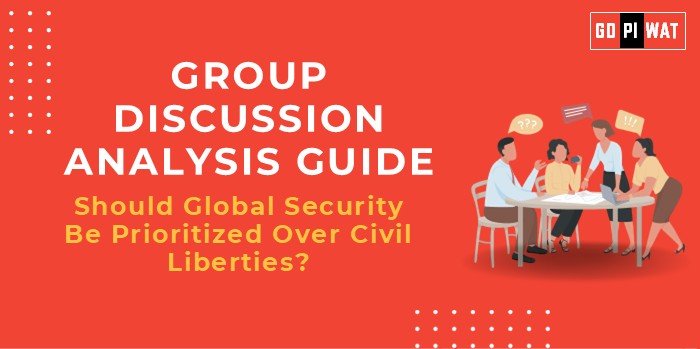📋 Group Discussion Analysis Guide
🌐 Should Global Security Be Prioritized Over Civil Liberties?
📝 Introduction to the Topic
🌍 Contextual Relevance
The balance between global security and civil liberties has been a critical debate, especially after major events like 9/11, the rise of global terrorism, cyber warfare, and pandemics. For B-school aspirants, understanding this trade-off is vital as it involves leadership, policy-making, and ethical decision-making in a globally interconnected world.
📜 Background
The tension arises from the need to protect citizens from threats while ensuring fundamental freedoms. Historical precedents like the Patriot Act in the U.S. post-9/11 and China’s surveillance systems highlight the dilemma.
📊 Quick Facts and Key Statistics
- 📈 Surveillance Expansion: Post-9/11, the global surveillance market grew to over $60 billion (Statista, 2023).
- 💻 Cyber Threats: Cyberattacks increased by 38% globally in 2022 (Checkpoint Research).
- ⚖️ Freedom Index Impact: Countries with increased surveillance reported a 20% decline in civil liberty scores (Freedom House, 2023).
- 🌐 Global Consensus: 70% of nations have enacted data privacy laws, showcasing the global concern over balancing the debate (UNCTAD, 2023).
🤝 Stakeholders and Their Roles
- 🏛️ Governments: Implement security measures, often at the cost of privacy (e.g., surveillance laws).
- 🗣️ Citizens: Advocate for the protection of rights and freedoms.
- 💡 Technology Companies: Develop tools that can either safeguard or compromise privacy.
- 🌐 International Organizations: Mediate norms and treaties for a balanced approach (e.g., UN’s initiatives on cyber laws).
🏆 Achievements and Challenges
✨ Achievements
- 🔍 Reduced Terrorism Threats: Through surveillance and intelligence sharing in high-risk zones.
- 🛡️ Cybersecurity Frameworks: Protect billions of transactions annually.
- 🤖 Innovations in AI: Enhance predictive threat analysis.
⚠️ Challenges
- ⚖️ Civil Rights Abuses: Cases like Edward Snowden’s revelations about the NSA.
- 🛑 Surveillance Overreach: Authoritarian misuse of security tools to suppress dissent.
- 🌍 Global Divide: Democracies face higher scrutiny than authoritarian regimes in balancing these trade-offs.
🌍 Global Comparisons
- ✅ Success: Estonia’s e-Governance balances security and privacy.
- ❌ Challenges: China’s “social credit system” raises significant privacy concerns.
💡 Structured Arguments for Discussion
- ✅ Supporting Stance: “Global security ensures national sovereignty and public safety, which are prerequisites for enjoying civil liberties.”
- 🛑 Opposing Stance: “Compromising civil liberties undermines democracy and creates a precedent for authoritarian practices.”
- ⚖️ Balanced Perspective: “An equilibrium between global security and civil liberties is necessary to ensure ethical governance and societal trust.”
🎯 Effective Discussion Approaches
- 📊 Opening Approaches:
- Start with a global statistic or case study.
- Use a rhetorical question like, “Can liberty exist without security?”
- Highlight a current event, such as cybersecurity concerns.
- ⚡ Counter-Argument Handling:
- Example: “While security is critical, robust checks can prevent its misuse. GDPR’s accountability measures are a template.”
🧠 Strategic Analysis of Strengths and Weaknesses
- 💪 Strengths: Advanced technologies enable precise threat monitoring.
- 🛠️ Weaknesses: Potential for misuse and ethical concerns.
- 🌟 Opportunities: International frameworks can harmonize laws globally.
- ⚠️ Threats: Loss of public trust in governments.
🏫 Connecting with B-School Applications
📚 Real-World Applications
- Projects on balancing privacy and security in tech products.
- Research on global cybersecurity policies.
🎓 Sample Interview Questions
- ❓ “Should companies comply with governments demanding backdoor access to encrypted systems?”
- ❓ “How do you balance ethical concerns in security-related decision-making?”
📘 Insights for Students
- 💡 Ethical leadership is key in managing trade-offs.
- 💼 Multidisciplinary approaches (law, technology, ethics) are essential in global business.


